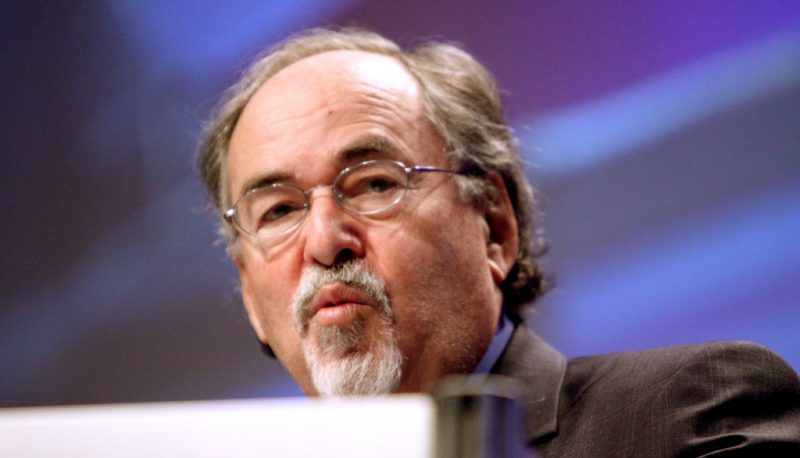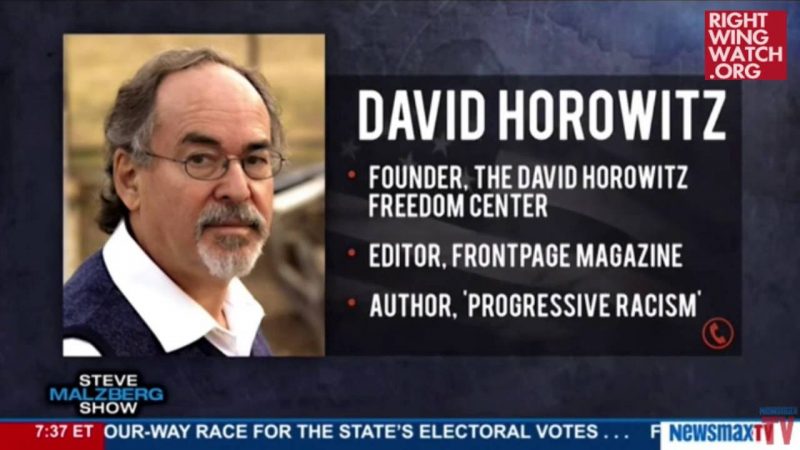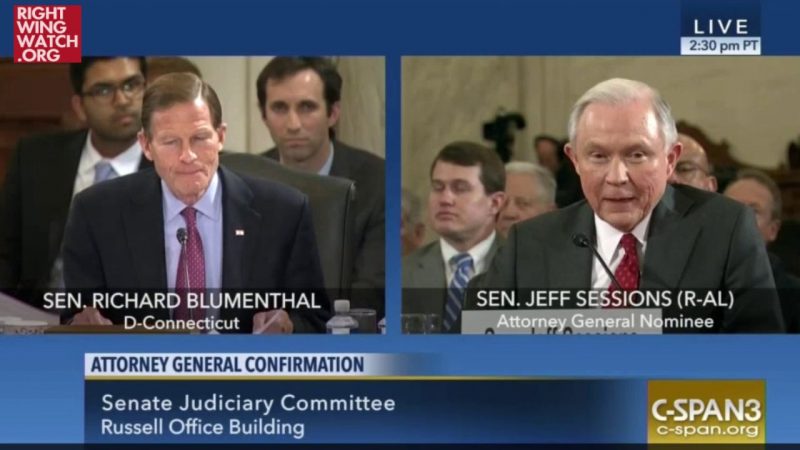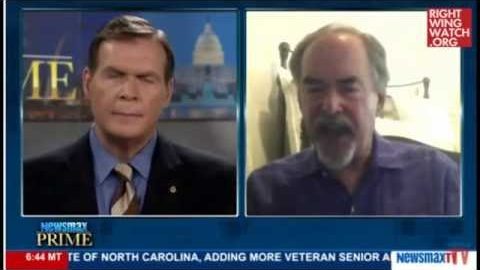Conservative activist David Horowitz apparently feels that he has not been getting enough attention lately, so he has spent the last few days creating a social media firestorm with a series of revisionist-history tweets about his view that the United States’ violent history of slavery and lynching doesn’t have anything to do with racism or ongoing problems of racial oppression.
These are ideas that Horowitz, a former leftist turned professional conservative crank, has been promoting in one form or another for decades. Yet that hasn’t stopped him from playing a key role in bringing far-right activists and politicians—including some who are now in positions of power in the Trump administration—together with ideologically allied funders.
Every fall, Horowitz organizes what he calls a “Restoration Weekend” at a resort in Palm Beach, where politicians, far-right activists and potential funders can rub shoulders and pitch their projects.
In 2014, now-Attorney General Jeff Sessions received an award at Restoration Weekend, presented by his then-aide Stephen Miller. Miller, now a senior adviser to President Trump, first partnered with Horowitz when he was in high school. Accepting the award, Sessions told Horowitz that receiving it was “a special treat and pleasure for me because you know how much I admire you.” Sessions, who had also spoken at a handful of other Horowitz-organized events, was forced to defend his relationship with Horowitz, whom he called a “brilliant individual,” in his confirmation hearing. At the hearing, Sessions told senators that he didn’t “believe David Horowitz is a racist or a person that would treat anyone improperly.”
Last year, Steve Bannon, then the White House chief strategist, spoke at Horowitz’s Restoration Weekend, along with former Trump adviser Sebastian Gorka and handful of members of Congress, including House Intelligence Committee Chairman Devin Nunes. Also there was J. Christian Adams, who was at the time a member of Trump’s “voter fraud” commission. At the event, they rubbed shoulders with the likes of Milo Yiannopoulos, Ann Coulter, Gavin McInnes and Laura Loomer.
Other past participants in Horowitz’s events have included Rick Perry, now the secretary of energy, Sen. Ted Cruz, Sen. Ron Johnson, Mike Huckabee, Rep. Steve King, Rep. Louis Gohmert and many other members of Congress.
Maybe Horowitz’s recent series of tweets will make some of these politicians reconsider their relationships with him, but given that he’s been saying variations on the same thing for decades with no repercussions from his Republican allies, that seems unlikely.
The latest Horowitz firestorm started on Sunday, when he commented on a thread from conservative religion scholar Robert P. George about white Americans’ culpability for the continuation of slavery. Horowitz responded that while slavery “was bad,” “all the slaves in America were enslaved by blacks and white Americans freed them.”
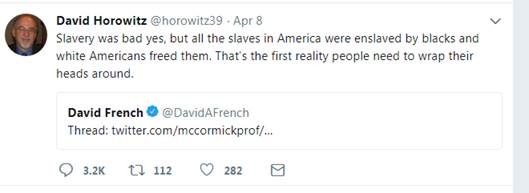
Horowitz then went to town over the next few days, digging in on his revisionist history of slavery, and adding some thoughts about lynching as well, tweeting a photo of a lynching to say that the victims were guilty of crimes and then complaining about “the anti-white racism” of current discourse about the history of lynching.
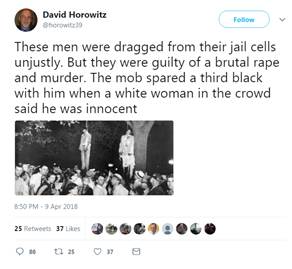
Horowitz’s “thank white people for ending slavery” shtick has been part of his routine for years, since long before future members of the Trump administration were partaking in his expensive Florida networking retreats.
Back in 2016, Horowitz made a similar case on an Indiana radio program, where he complained that nobody gives “white Christian males” enough credit for ending slavery, when it was “black Africa that enslaved blacks”:
As Horowitz pointed out in that interview, he’s been singing this tune since at least 2001, when he attempted to place ads in dozens of college papers arguing against reparations for slavery and demanded “the gratitude of black America” for white people who worked to end it. The Guardian described the ads:
“There is no single group clearly responsible for the crime of slavery” is the heading of the first point in the ad which blames “Black Africans and Arabs [as] responsible for enslaving the ancestors of African-Americans. There were 3,000 black slave-owners in the ante-bellum United States. Are reparations to be paid by their descendants too?”
…
Most controversially the advertisement argues that white Christians – English and American – created the anti-slavery movement and if it were not for the sacrifices of white soldiers in the civil war, blacks would still be slaves instead of enjoying one of the highest standards of living in the world. “Where,” asks the ad rhetorically, “is the gratitude of black America and its leaders for those gifts?”
He even wrote a book about it.
And there’s a lot more vitriol where that comes from. In recent years, Horowitz has claimed that the term “people of color” is “an ideological term to demonize white people”; said that the “racism in this country that is the real problem is black racism”; and claimed that there are no real racial disparities in the U.S. because African-American NBA players make a lot of money and “our culture is dominated by black music, if you can call that music.”




